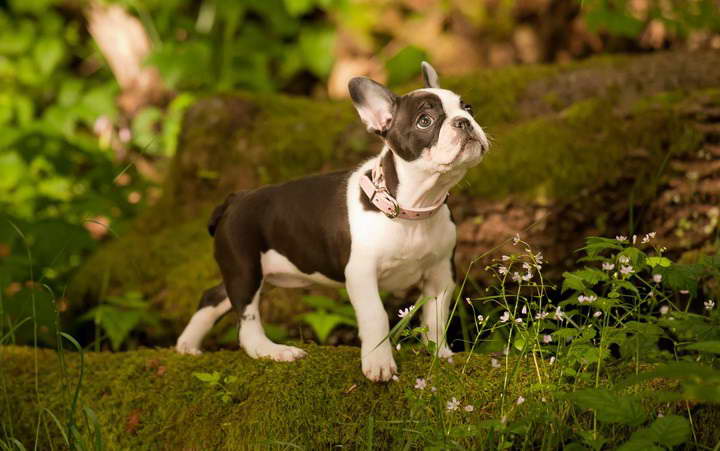The French Bulldog Boston Terrier Mix, commonly known as the “Frenchton,” merges the charismatic qualities of both the French Bulldog and the Boston Terrier. This crossbreed is adored for its compatibility with various lifestyles and its endearing personality traits, making it a popular choice among dog lovers.
What is a French Bulldog Boston Terrier Mix?
Overview and Origin: A hybrid of the French Bulldog and Boston Terrier, known for its good temperament and adaptability to different living environments.
Characteristics of the French Bulldog Boston Terrier Mix
- Physical Traits: Compact size, distinctive bat ears, and a strong, muscular build. They typically feature the shorter snout of the French Bulldog and the agile frame of the Boston Terrier.
- Personality Traits: Known for their loving, playful nature. They are friendly, easy to train, and make excellent companions.
Care Requirements
- Exercise Needs: Suitable for owners who can provide moderate exercise, accommodating the mix’s energy levels without overexerting them due to the brachycephalic traits of the French Bulldog.
- Diet and Nutrition: Focus on a balanced diet to manage weight and prevent obesity.
- Health Monitoring: Watch for signs of breathing difficulties, joint issues, and other inheritable conditions.
Training and Socialization
- Training Tips: Responds well to positive reinforcement techniques, benefiting from early training and socialization to nurture their friendly nature.
- Socialization Needs: Early exposure to various environments and people to develop a well-rounded temperament.
Health Concerns and Lifespan
- Common Health Issues: Potential for brachycephalic syndrome, joint problems like patellar luxation, and allergies.
- Expected Lifespan: Generally healthy with a lifespan ranging from 12 to 15 years, depending on genetics and overall care.
Living Environment
- Adaptability: Great for apartment living due to their size and moderate exercise needs. They thrive in environments where they can be close to their family.
FAQ
- Is this mix suitable for families with children?: Yes, they typically do well with children due to their gentle and affectionate nature.
- How much grooming do they require?: Low to moderate grooming needs; regular brushing will manage shedding and help keep the coat healthy.
Conclusion
The French Bulldog Boston Terrier Mix is an excellent choice for individuals or families looking for a compact, affectionate dog that thrives on human interaction. With proper care, training, and socialization, a Frenchton can be a delightful and loving addition to any home.
This overview is based on traits typical to the breed mix, and individual dogs may vary. Prospective owners should always meet the specific dog and discuss with breeders or rescue organizations to understand any unique traits or needs.

Dr. Emily Harper is a California-based veterinarian specializing in terrier breeds. With years of experience in veterinary medicine and a passion for terrier care, she focuses on breed-specific health, grooming, and behavior.
Emily’s journey began with a love for dogs, leading her to pursue a career in veterinary medicine and develop expertise in terriers. She has authored numerous articles on terrier health and grooming and educates pet owners on providing the best care for their companions.
In her free time, Dr. Harper enjoys hiking California’s trails with her rescue terriers, Max and Bella, and spending time with her family.


